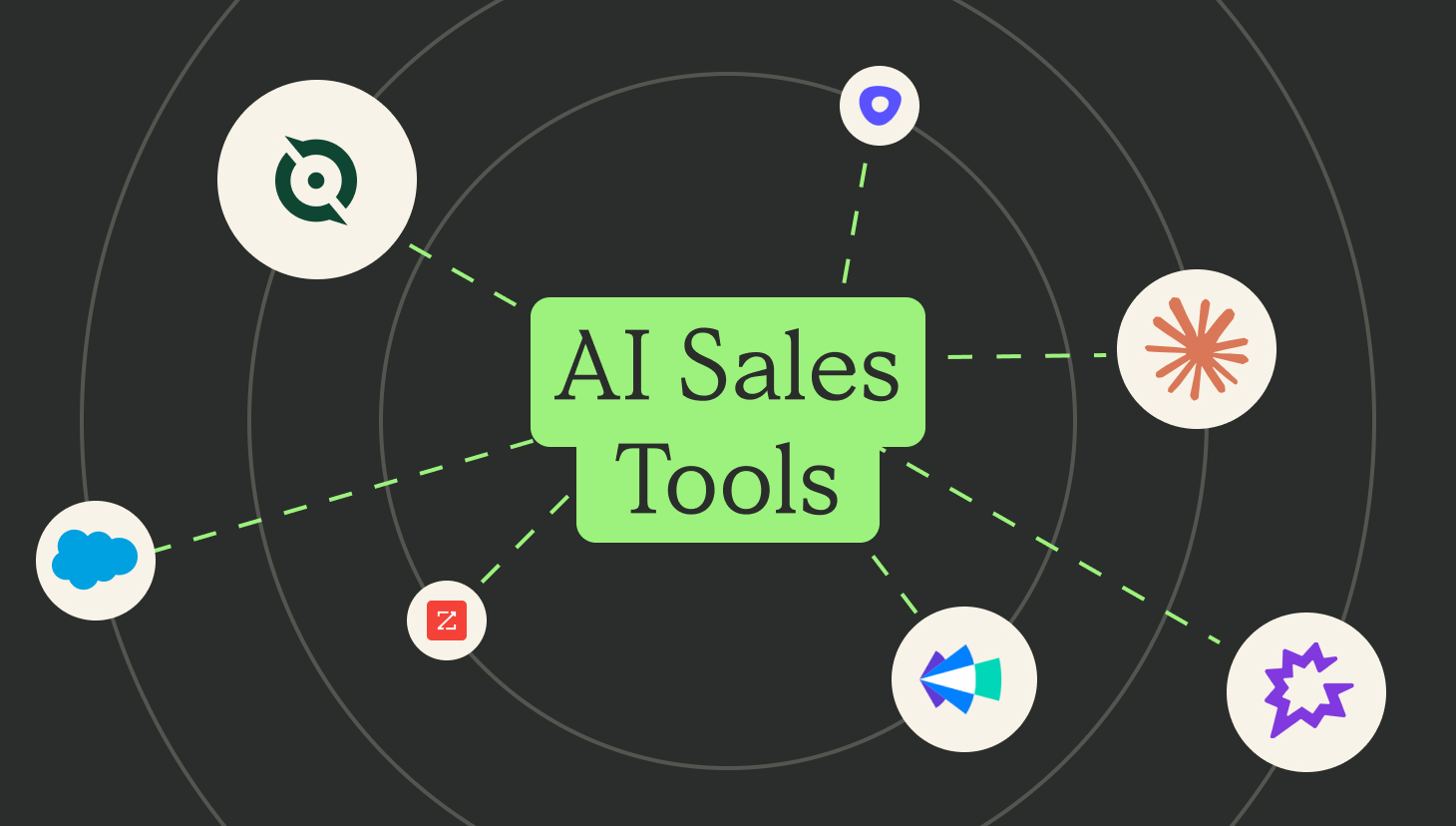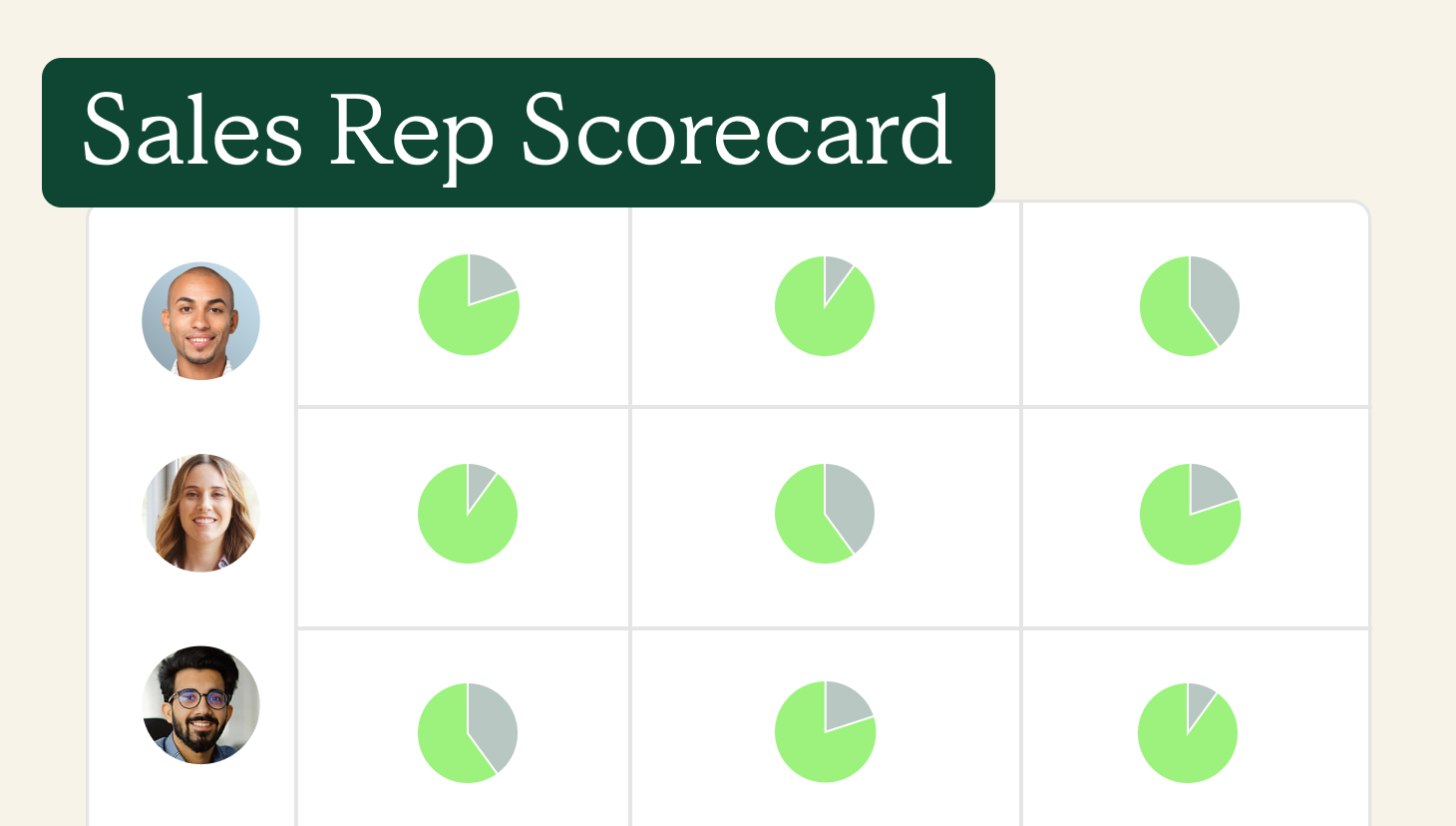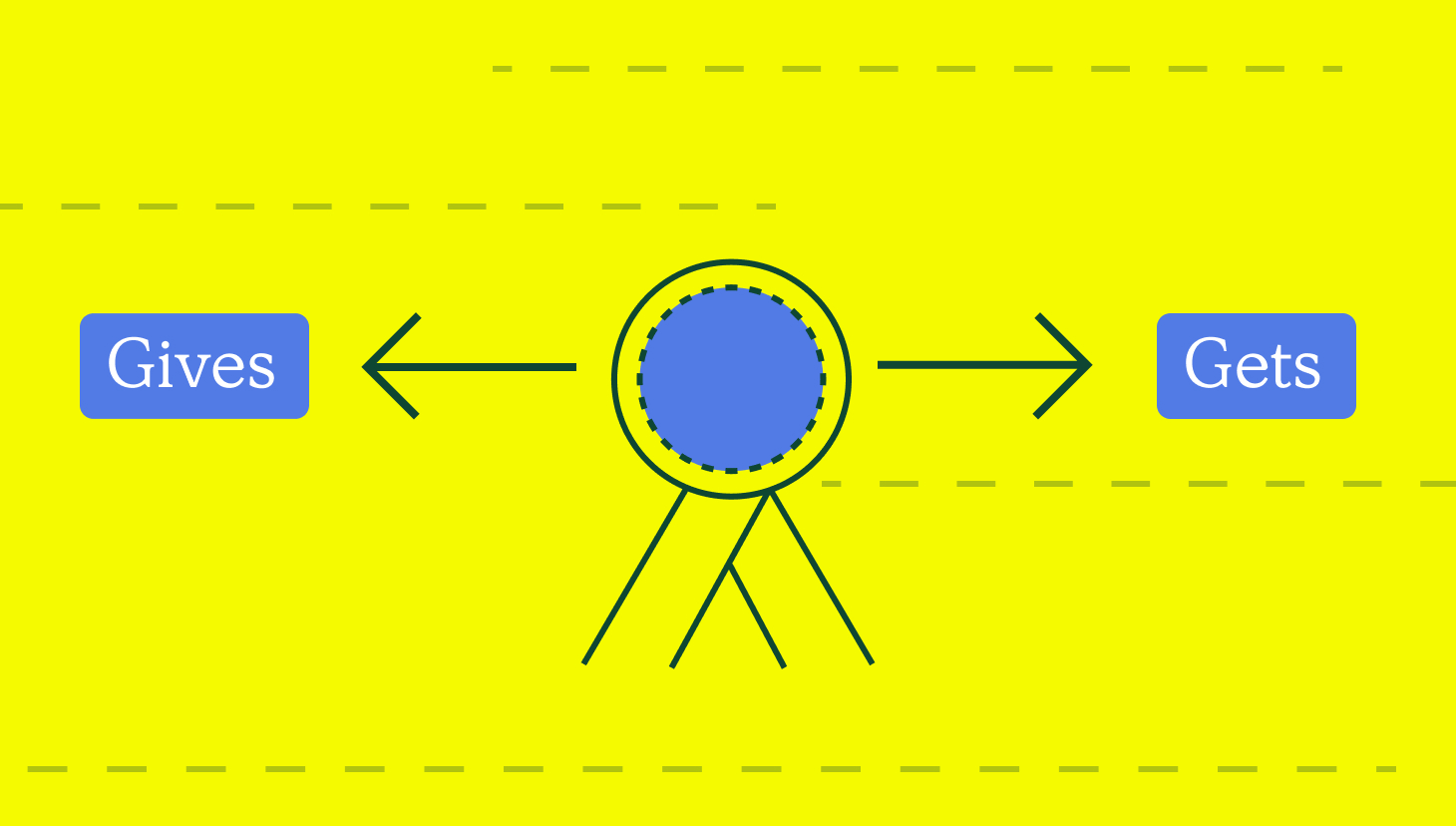The rise of AI in sales has revolutionized how businesses approach customer relationships, automate processes, and drive revenue growth. As a result, more companies recognize its potential to enhance efficiency and decision-making.
AI adoption in sales teams has skyrocketed, with 81% of teams either experimenting with or fully embracing AI technologies, according to Salesforce.
The impact is undeniable, as 83% of sales teams using AI report revenue growth compared to 66% of those without AI. This technological shift is not just about efficiency; it’s transforming the entire sales landscape, with AI-powered tools enhancing lead generation, customer insights, and sales forecasting accuracy.
In the post, we highlight the best AI tools for sales, broken down by category, and share tips for effective AI sales technology implementation.
AI Sales Agents
First, let’s take a look at the various AI sales agents on the market. These automated, AI-powered systems engage with prospects, qualify leads and assist in the sales process by mimicking human-like interactions through chat, email, or voice.
Claude
- Best used for: Sales competitor, data, and call analysis, and customized pitches and follow-up emails
- Top feature highlight: natural language processing capabilities to analyze data and generate human-like text outputs
- Top supported integrations: Salesforce, GitHub, and Google Docs
- Starting price: Free for individuals
- G2 rating: 4.5 stars
- Capterra rating: 4.7 stars
Harvey.AI
- Best used for: Generating sales contracts
- Top feature highlight: Natural language personal assistant
- Top supported integrations: Microsoft SharePoint, CoPilot, and Word
- Starting price: Contact sales
- G2 rating: No reviews
- Capterra rating: No listing
Salesforce Einstein GPT
- Best used for: Sales emails, call summaries, personalized close plans, customer research
- Top feature highlight: Generative AI
- Top supported integrations: Salesforce Cloud, Slack, and OpenAI
- Starting price: $75/user/month
- G2 rating: 4.4 stars
- Capterra rating: 4.4 stars
Exceed.ai
- Best used for: Lead engagement automation
- Top feature highlight: Sales AI Assistant
- Top supported integrations: Salesforce, Hubspot, Sugar CRM, Marketo, Eloqua, Pardot
- Starting price: Contact for pricing
- G2 rating: 4.7 Stars
- Capterra rating: 4.8 Stars
Streamline commissions for your RevOps, Finance, and Sales teams
Design, track, and manage variable incentives with QuotaPath. Give your RevOps, finance, and sales teams transparency into sales compensation.
Talk to SalesAI Powered CRM
Now, let’s get into AI-powered CRMs.
An AI-powered CRM is a customer relationship management system that leverages artificial intelligence to automate tasks, analyze customer data, predict sales trends, and enhance engagement through personalized insights and recommendations.
Here are a few in the market worth exploring.
Salesforce AI Cloud
- Best used for: Automation to boost rep efficiency
- Top feature highlight: Predictive and generative AI
- Top supported integrations: Google Cloud, Slack, MailChimp, DocuSign, and Jira
- Starting price: $330/user/month
- G2 rating: 4.4 Stars
- Capterra rating: 4.4 Stars
HubSpot AI Sales Hub
- Best used for: Rep efficiency and accelerating the sales process
- Top feature highlight: Sales Automation
- Top supported integrations: Gmail, Slack, Zoom, QuotaPath, PandaDoc, Gong
- Starting price: $20/month per seat
- G2 rating: 4.4 Stars
- Capterra rating: 4.5 Stars
Pipedrive AI Sales Assistant
- Best used for: Streamlining sales activities
Top feature highlight: AI-driven insights and notifications
Top supported integrations: Google Workspace, Microsoft Outlook, Zapier
Starting price: $49 per user per month, billed annually
G2 rating: 4.3 Stars
Capterra rating: 4.5 Stars
Close.io AI
- Best used for: Task management and prospect communcation
- Top feature highlight: AI tools for sales task automation
- Top supported integrations: Zapier, Zendesk, HubSpot
- Starting price: $49 per user per month, billed annually
- G2 rating: 4.7 Stars
- Capterra rating: 4.7 Stars
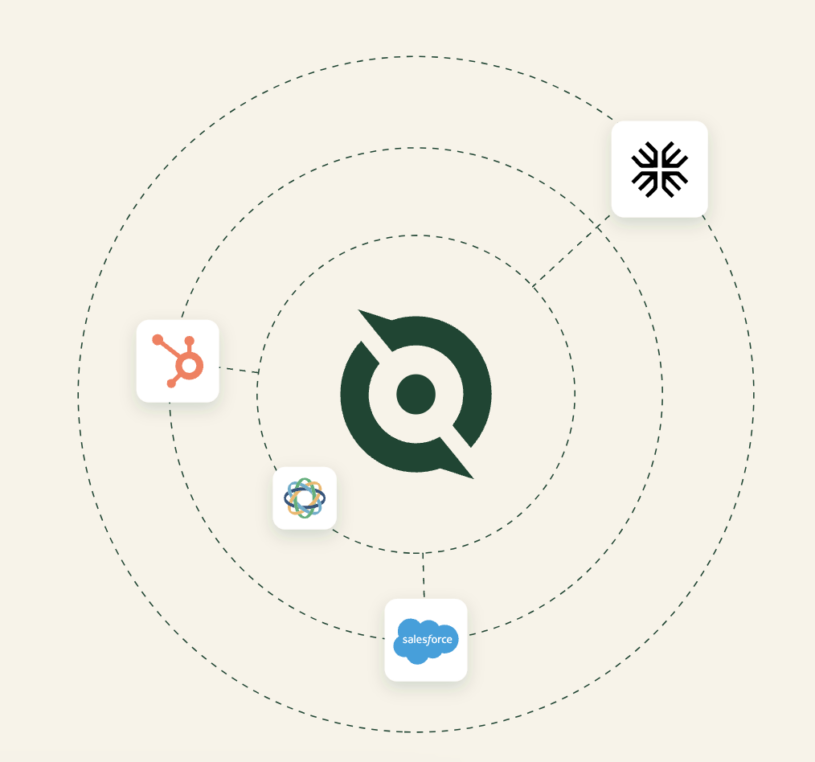
QuotaPath Integrations
QuotaPath integrates with CRMs, data warehouses, ERPs, and more. Check out the full list here.
Enter Integrations HubAI Sales Forecasting
What about sales forecasting? An AI sales forecasting tool analyzes historical sales data, market trends, and customer behavior using machine learning to predict future revenue, identify sales opportunities, and optimize decision-making for more accurate and data-driven sales strategies.
Here are a few we’re paying attention to:
Clari Revenue Intelligence
- Best used for: Providing AI-driven revenue operations and sales forecasting solutions
- Top feature highlight: Offers predictive analytics to enhance forecast accuracy and pipeline management
- Top supported integrations: Salesforce, Microsoft Dynamics 365, HubSpot
- Starting price: Pricing details are available upon request
- G2 rating: 4.8 Stars
- Capterra rating: 4.5 Stars
People.ai
- Best used for: Leveraging AI to optimize sales and marketing activities by capturing and analyzing engagement data
- Top feature highlight: Automates data capture to provide insights into sales performance and customer interactions
- Top supported integrations: Salesforce, Microsoft Dynamics 365, SAP
- Starting price: Pricing details are available upon request
- G2 rating: 4.4 Stars
- Capterra rating: 4.8 Stars
InsightSquared by Mediafly
- Best used for: Delivering advanced sales analytics and forecasting to drive data-informed decision-making
- Top feature highlight: Provides real-time dashboards and reports to monitor sales metrics and pipeline health
- Top supported integrations: Salesforce, HubSpot, Microsoft Dynamics 365
- Starting price: Pricing details are available upon request.
- G2 rating: Mediafly 4.4 Stars
- Capterra rating: 4.6 Stars
Aviso AI
- Best used for: Enhancing sales forecasting and pipeline management
- Top feature highlight: Utilizes machine learning to predict deal outcomes and recommend next-best actions
- Top supported integrations: Salesforce, Microsoft Dynamics 365, Oracle
- Starting price: Pricing available upon request
- G2 rating: 4.4 Stars
- Capterra rating: 4.2 Stars
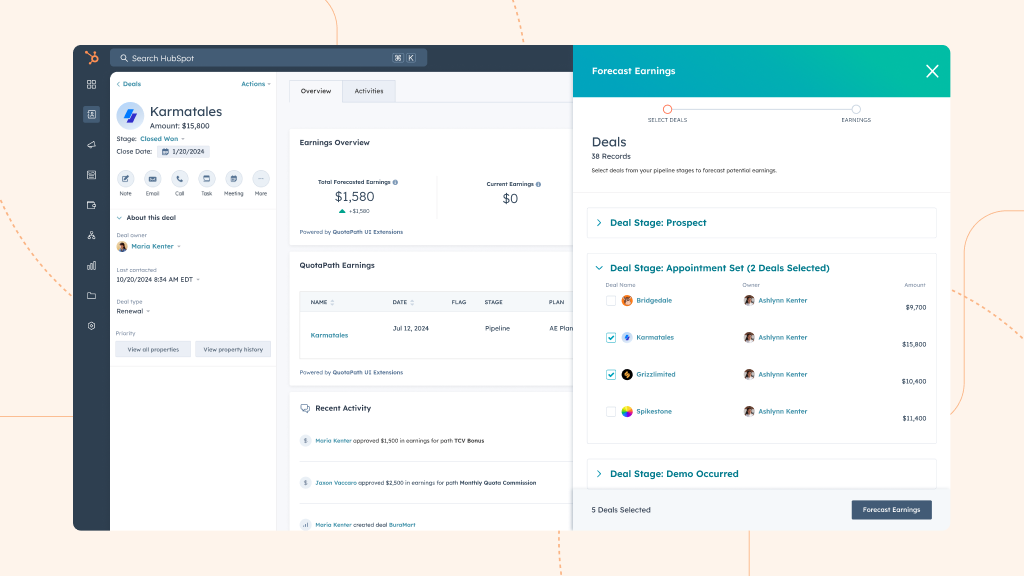
AI Prospecting Tools
Next, let’s talk AI prospecting tools — a very hot topic as people debate their likes or dislikes with robotic personalization.
An AI prospecting tool automates lead generation by analyzing vast data sources to identify high-quality prospects, predict buyer intent, and personalize outreach, helping sales teams efficiently target and engage potential customers. Below are some of the industry’s leading platforms.
ZoomInfo AI
- Best used for: Sales prospecting
- Top feature highlight: Sales AI assistant
- Top supported integrations: Salesforce, HubSpot, Microsoft Dynamics 365
- Starting price: Pricing available upon request
- G2 rating: 4.5 Stars
- Capterra rating: 4.5 Stars
Apollo.io AI
- Best used for: Streamlined prospecting efforts
- Top feature highlight: Sequences and automation to manage outreach campaigns
- Top supported integrations: Salesforce, HubSpot, Pipedrive
- Starting price: Offers a free tier; premium plans start at $39 per user per month
- G2 rating: 4.7 Stars
- Capterra rating: 4.6 Stars
UserGems
- Best used for: Tracking job changes of past customers to identify new sales opportunities
- Top feature highlight: Alerts generated when key contacts move to new companies
- Top supported integrations: Salesforce, HubSpot, Outreach
- Starting price: Pricing available upon request
- G2 rating: 4.7 Stars
- Capterra rating: 4.7 Stars
LeadIQ
- Best used for: Simplifying lead generation by capturing and enriching prospect data from various online sources
- Top feature highlight: Browser extension for gathering lead information and recording in CRM
- Top supported integrations: Salesforce, HubSpot, Outreach
- Starting price: Offers a free tier; premium plans start at $75 per user per month
- G2 rating: 4.2 Stars
- Capterra rating: 4.4 Stars
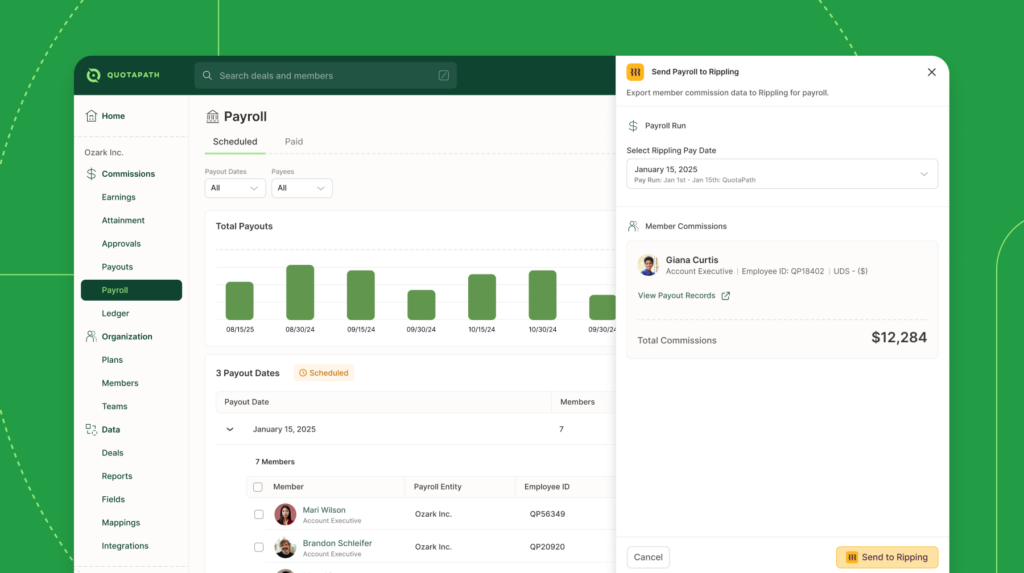
AI Commissions Tracking
We’ve also seen AI sales tools pop up in our category, sales compensation.
While some have agents built into their platform so that you can ask questions about earnings on specific deals, QuotaPath’s AI is more practical. Instead of manually translating your comp plans into your compensation management system, QuotaPath’s AI prepares your plan by prompt or PDF upload. This allows for a shorter entry to barrier to begin automating your commission tracking process.
Take a look at a few other use cases below.
QuotaPath
- Best used for: End-to-end commission tracking from comp plan creation through push-to-payroll.
- Top feature highlight: AI-powered plan builder
- Top supported integrations: HubSpot, Salesforce, Rippling
- Starting price: Free trial, then $25 per user per month, billed annually
- G2 rating: 4.7 Stars
- Capterra rating: 4.6 Stars
CaptivateIQ
- Best used for: Compensation automation
- Top feature highlight: CaptivateIQ Assist
- Top supported integrations: Salesforce, HubSpot
- Starting price: Available upon request
- G2 rating: 4.7 Stars
- Capterra rating: 4.8 Stars
Leaptree
- Best used for: Compensation automation
- Top feature highlight: Automation
- Top supported integrations: Salesforce.
- Starting price: Pricing details are available upon request
- G2 rating: 4.8 Stars
- Capterra rating: No reviews
Core Commission
Best used for: Automate complex commissions
Top feature highlight: CoreBot
Top supported integrations: QuickBooks, Salesforce, Microsoft Dynamics
Starting price: $20 per payee/month
G2 rating: 4.5 Stars
Capterra rating: 4.7 Stars
Visdum
- Best used for: Compensation automation for early-stage organizations
- Top feature highlight: Ease of use
- Top supported integrations: Salesforce
- Starting price: Available upon request
- G2 rating: 4.9 Stars
- Capterra rating: 4.8 Stars
Streamline commissions for your RevOps, Finance, and Sales teams
Design, track, and manage variable incentives with QuotaPath. Give your RevOps, finance, and sales teams transparency into sales compensation.
Talk to SalesAI Sales Coaching
Lastly, let’s explore AI sales tools for coaching.
An AI sales coaching tool uses artificial intelligence to analyze sales calls, emails, and rep performance, providing real-time feedback, personalized training recommendations, and data-driven insights to improve sales skills and effectiveness.
Check out our recs:
Gong.io
- Best used for: Enhancing sales team performance
- Top feature highlight: Conversation AI that captures and analyzes customer interactions to provide actionable insights
- Top supported integrations: Salesforce, HubSpot, Microsoft Dynamics
- Starting price: Available upon request
- G2 rating: 4.8 Stars
- Capterra rating: 4.8 Stars
Chorus.ai
- Best used for: Improving call efficacy
- Top feature highlight: Conversation Intelligence to capture and analyze customer engagements
- Top supported integrations: Zoom, Salesforce, Microsoft Teams
- Starting price: Available upon request
- G2 rating: 4.5 Stars
- Capterra rating: 4.5 Stars
ExecVision
- Best used for: Scaling sales coaching
- Top feature highlight: Conversation Intelligence to record and analyze sales engagement
- Top supported integrations: Salesforce, HubSpot, Microsoft Dynamics.
- Starting price: Available upon request.
- G2 rating: Mediafly 4.4 Stars
- Capterra rating: 4.3 Stars
Second Nature
- Best used for: Boost sales, enhance training effectiveness, and increase productivity
- Top feature highlight: AI-driven role-play simulator
- Top supported integrations: Salesforce, Microsoft Dynamics
- Starting price: Available upon request.
- G2 rating: 4.6 Stars
- Capterra rating: 5 Stars
Implementation Best Practices
While AI sales tools offer significant advantages, their effectiveness depends on how well they are implemented. To maximize the benefits of AI-driven sales solutions, businesses must follow best practices that ensure seamless adoption and user engagement for long-term success.
Change Management
Successful AI tool adoption requires strong stakeholder buy-in and early alignment between sales and operations teams. Ensuring that key decision-makers understand the value of AI in sales can help foster a culture of acceptance and minimize resistance. Engaging end users in discussions about how AI will improve efficiency and effectiveness, building trust and enthusiasm for the transition.
To manage workflow changes effectively, adopt a structured approach, such as phased rollouts or pilot programs. An incremental implementation allows teams to adapt gradually, reducing disruptions to daily operations. Pilot programs help identify potential challenges before full deployment, enabling teams to refine processes and address user concerns early. Providing clear communication about implementation timelines and expectations further smooths the transition.
Training Requirements
Comprehensive onboarding ensures that different team roles maximize the benefits of sales AI tools. Administrators need in-depth training in configuring and managing the system, while sales reps require hands-on practice with AI-driven insights and automation features. Training sessions tailored to each role enhance adoption rates and confidence in effective tool use.
Ongoing education is equally important to keep teams up to date with AI capabilities and best practices. Regular workshops, resource hubs with self-service materials, and certification programs help reinforce learning and drive continuous improvement. Encouraging knowledge-sharing among team members also fosters a collaborative learning environment, ensuring long-term success with AI tools.
ROI Measurement
Establish clear benchmarks before implementation to accurately assess the impact of AI sales tools. Metrics such as time saved on administrative tasks, revenue uplift, and customer engagement improvements provide tangible evidence of AI’s value. Setting realistic goals ensures organizations can measure progress effectively and make data-driven decisions.
Tracking key performance indicators (KPIs) such as deal velocity, sales rep productivity, and forecast accuracy helps quantify AI’s contribution to sales performance. Regularly analyzing these metrics enables teams to optimize AI usage and refine strategies. Organizations should also collect qualitative feedback from users to complement quantitative data, ensuring a holistic understanding of ROI.
Security Considerations
Data security is a critical concern when implementing AI sales technology, especially given the sensitive nature of customer information. Companies must ensure that AI tools integrate securely with existing CRMs and comply with industry regulations such as GDPR and CCPA. Understanding vendor security policies and data handling practices is essential for mitigating risks.
Selecting AI tools with robust encryption, access controls, and regular security audits enhances data protection. Businesses should establish clear internal security protocols, including user authentication measures and permission-based access. Regular security reviews and updates help maintain compliance and safeguard sensitive information from evolving threats.
Try QuotaPath for free
Try the most collaborative solution to manage, track and payout variable compensation. Calculate commissions and pay your team accurately, and on time.
Start TrialFinal Thoughts
AI sales tools have become a necessity for modern sales teams looking to drive efficiency, improve customer interactions, and boost revenue. With the right AI sales technology and a strategic implementation plan, businesses can harness AI to stay ahead in an increasingly data-driven sales landscape. Embracing change and prioritizing training, security, and performance measurement enables sales teams to unlock the full potential of AI and achieve sustainable growth.
Learn how QuotaPath can automate compensation plan creation. See our new AI-Powered Plan Builder over a demo.
FAQ
How do AI sales tools impact ROI?
AI sales tools improve ROI by increasing efficiency, reducing administrative workload, and enhancing lead conversion rates. They help sales teams close deals faster and optimize resource allocation.
What’s the difference between AI sales agents and traditional sales tools?
An AI sales agent uses machine learning and automation to analyze data, provide insights, and engage with prospects through personalized outreach at scale. Meanwhile, traditional sales tools primarily assist with data organization and reporting.How secure are AI-powered sales tools?
AI-powered sales tools prioritize security with encryption, role-based access controls, and
